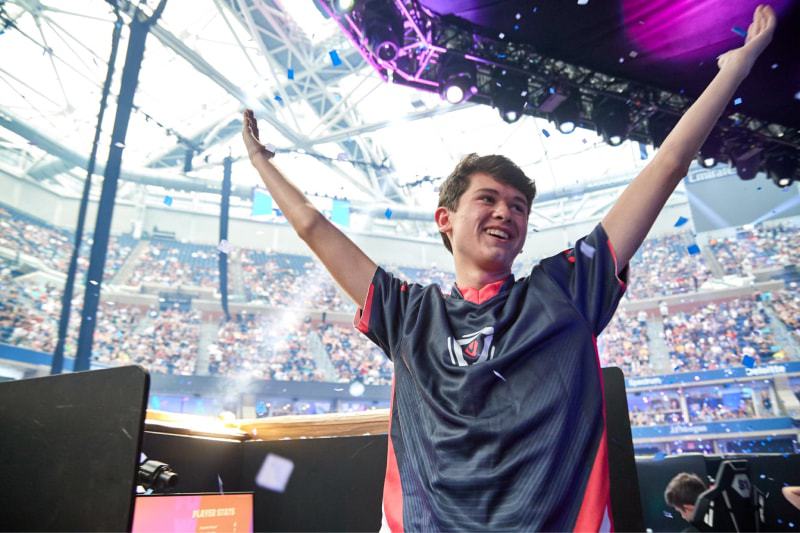Mentioned in this article
Not long after the last shots were fired and those endless fortification pieces fell to the floor, the Fortnite ![]() World Cup winners were front-page news.
World Cup winners were front-page news.
The next 24 hours were a rodeo of repetitive headlines, almost all focusing on the winnings: $3M USD for the solos champion, Kyle “Bugha” Giersdorf, and another $3M for duos winners Emil “Nyhrox” Bergquist Pedersen and David “aqua” W.
This was the narrative Epic Games ![]() was aiming for, and while all champions (including the creative competition winners) deserve every dollar, is a hefty prize purse the best measure of an esport event’s success?
was aiming for, and while all champions (including the creative competition winners) deserve every dollar, is a hefty prize purse the best measure of an esport event’s success?
There are three things that typically make the general public aware of esports: big money (mostly winnings or investments), record audience numbers, and celebrities getting in on the act. The Fortnite World Cup had all three, with a $30M purse, over 500K peak viewers on Twitch alone, and a performance by Marshmello…whose market value by now is weirdly tied to the success of one battle royale videogame.
It was the “instant millionaire” headline that became irresistible for mainstream media outlets, which also made a point of emphasizing the winner’s ages—both Bugha and the third-place competitor Shane “Epikwhale” Cotton are 16, and Epic Games actually lowered the eligibility rules for the tournament to 13. The press write-ups (thankfully) framed the victories less as lottery wins and more as genuine accomplishments, but to call these overnight success stories is still a little extreme.

Sure, Bugha went to bed on Sunday night with $3M more in his bank account than the day before, but the World Cup qualifiers took place over the course of three months. There were ten weeks of competition across six regions, with up to ten matches being played across two days every week. This is on top of the hours spent practicing, streaming, and strategizing. Furthermore, to be that proficient in gaming, you must pick it up at an early age. A good example is the second place Solo competitor Harrison “Psalm” Chang, who played Heroes of the Storm competitively as far back as 2015, but earned just over $80K in prizes before retiring for Fortnite.
Related Article: The Fortnite World Cup Experience: All About The Fans
Again, is the prize money the success metric we should be focusing on? Several outlets also made a sport of comparing the Fortnite World Cup to Wimbledon, noting that the solos winner of the world’s most famous tennis tournament comes up short, with just $2.9M in winnings. Leaving aside the fact you have only a handful of non-league sports to make this comparison with, the All England Club made £256.7M GBP ($312.1M) in turnover year-over-year for 2018. Half of that came through linear broadcast deals, which the Fortnite World Club was entirely without. Sponsors too for that matter, despite insisting that all competitor’s jerseys minimize their respective team logos, and remove any brand partners.
Of course, the esports-to-sports comparison excludes the fact that Wimbledon didn’t put $49.4M on the line to promote a variety of in-court costumes, custom tennis rackets, or dance moves for Novak Djokovic to break out on the verge of victory. Nor does it take into account that the 33 digital media deals Epic Games secured offer far better exposure for the Fortnite brand. From baffled news desk hosts to the winner’s interview with Jimmy Fallon, everyone has their eyes and voice on the game. While I hope the upcoming Fortnite Champions Series pushes for sustainable revenue if only for the competitor’s sake, the World Cup remains both a marketing stunt and legitimate competition in my eyes.
In less than a month’s time, this conversation will erupt again, as Dota 2’s The International ![]() (TI) dishes out over (at least) $31M in winnings—even if the individual takings won’t go even near Fortnite’s. The difference is that this money isn’t just a one-off to buy media attention, but continues a seven-year tradition of the fans pushing up the prize pool through in-game Dota 2 purchases, while the publisher, Valve
(TI) dishes out over (at least) $31M in winnings—even if the individual takings won’t go even near Fortnite’s. The difference is that this money isn’t just a one-off to buy media attention, but continues a seven-year tradition of the fans pushing up the prize pool through in-game Dota 2 purchases, while the publisher, Valve ![]() , makes three times the final purse.
, makes three times the final purse.
Related Article: The Rise of Fortnite – By The Numbers
TI has nine years of history over Fortnite, and its story long ago shifted from gold to glory. That’s where I hope the narrative goes for Fortnite, even if I personally don’t think it could survive without an Epic prize pool. This season was plagued with competitive imbalance and questionable decisions, but eliminating these for next year’s World Cup not only legitimizes the competition, but it also opens up the possibility of a repeat champion—something I’d gladly wade through dozens more repetitive news stories to see.

